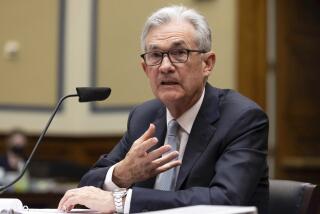World Financial Forecast: Cloudy, Clear
- Share via
NEW YORK — It was the best of times, it was the worst of times. Budget and trade deficits soared--but so did gross national product. Americans spent more than ever but our industry became less competitive. Corporate America went on a debt-financed merger spree--and reported record earnings. The United States enjoyed record economic expansion--and became a debtor nation for the first time since World War I. Incomes boomed, homeless filled the streets.
The ‘80s were a time of economic paradox, not just here, but worldwide. Communism failed, capitalism triumphed--but only if you didn’t count the Third World. The world economy grew more integrated than ever before but protectionism also increased.
The outlook for the ‘90s? Unsettled and cloudy. The world economy contains the seeds of a great boom and a great depression; the ‘90s could see either or both. Technological progress, European integration and rising standards of living around the Pacific Rim could bring back the good old 1960s. This was when Americans thought average, single-income families could--and should--own their own homes while watching their standards of living rise every year.
That would be nice, but the world economy is as likely to belly-up as boom. International cooperation can help deter trouble but the outlook is complicated by current relationships. With U.S. prosperity still dependent on an inflow of Japanese capital that many Americans resent, and tensions between the two Pacific partners ratcheting up year by year, the United States and Japan could waste the 1990s in futile but expensive trade wars.
Meanwhile, Western Europe could be too busy picking up the pieces in the East to care much about the rest of the world. An isolationist Europe might restrict imports from both the United States and Asia. Instead of one dynamic world economy, we could end up with three stagnant, quarreling blocs.
One other question mark hovers over the future. In most of the world, the ‘80s were the decade of Thatcherism--Reaganomics without the tax cuts. The basic idea was to make life better for the rich in the belief that this prosperity would “trickle down.” Maybe. Historians generally (not universally; historians, like economists, glory in contradiction) blame 1920s speculation for the Great Depression of the ‘30s. The rich had plenty of money to invest, but the poor and middle class had no money to buy.
There was more. International finance resembled a giant Ponzi scheme. Germany borrowed from the United States to pay debts to Britain and France. Britain and France used their German money to pay U.S. war debt. But when the crash came, Americans had no more money for Germany. Without U.S. money, Germany collapsed. Without German money, France and Britain could not pay debts.
Some financial historians warn that we are in danger of repeating this dismal story, with Japan lending money to the United States so that we can service foreign debt--the largest, fastest-growing debt in the world. If Tokyo stock and real-estate markets should falter--and there are plenty of reasons why they should--Japanese money would dry up overnight. The shock could bring down America’s banking system, cause a new Great Depression and leave the dollar trading one-for-one with the peso.
Oh well. History is not only bunk, the State Department tells us it’s over. Happy New Year.
More to Read
Inside the business of entertainment
The Wide Shot brings you news, analysis and insights on everything from streaming wars to production — and what it all means for the future.
You may occasionally receive promotional content from the Los Angeles Times.










